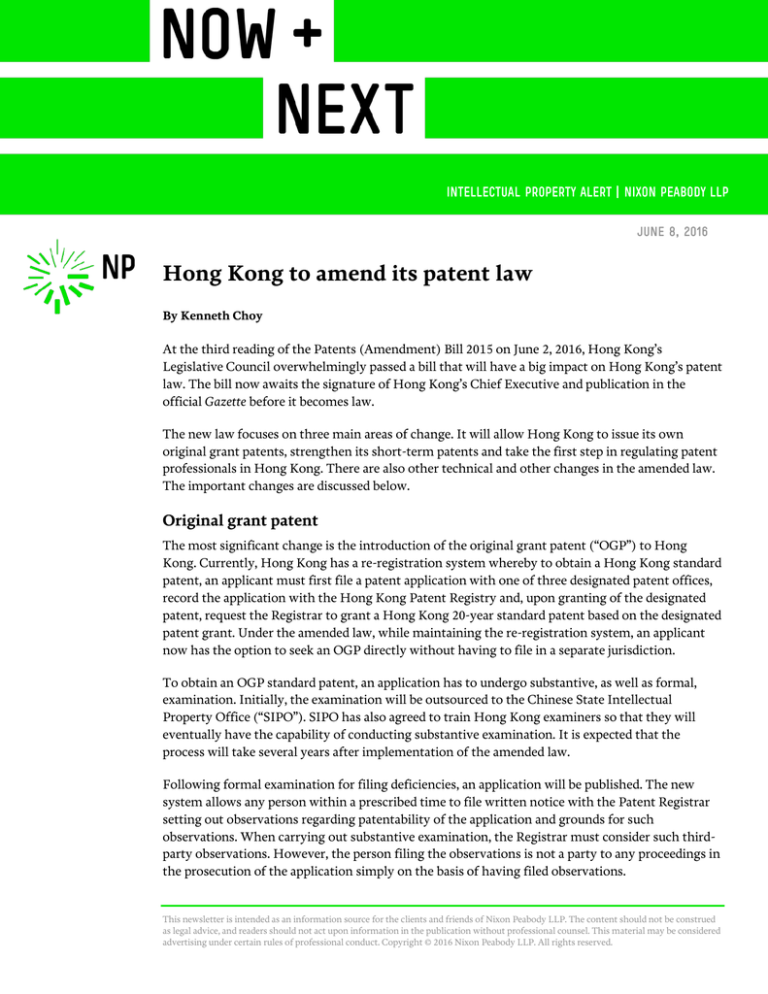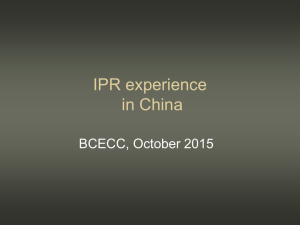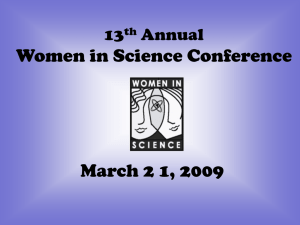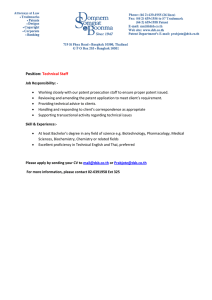
June 8, 2016
Hong Kong to amend its patent law
By Kenneth Choy
At the third reading of the Patents (Amendment) Bill 2015 on June 2, 2016, Hong Kong’s
Legislative Council overwhelmingly passed a bill that will have a big impact on Hong Kong’s patent
law. The bill now awaits the signature of Hong Kong’s Chief Executive and publication in the
official Gazette before it becomes law.
The new law focuses on three main areas of change. It will allow Hong Kong to issue its own
original grant patents, strengthen its short-term patents and take the first step in regulating patent
professionals in Hong Kong. There are also other technical and other changes in the amended law.
The important changes are discussed below.
Original grant patent
The most significant change is the introduction of the original grant patent (“OGP”) to Hong
Kong. Currently, Hong Kong has a re-registration system whereby to obtain a Hong Kong standard
patent, an applicant must first file a patent application with one of three designated patent offices,
record the application with the Hong Kong Patent Registry and, upon granting of the designated
patent, request the Registrar to grant a Hong Kong 20-year standard patent based on the designated
patent grant. Under the amended law, while maintaining the re-registration system, an applicant
now has the option to seek an OGP directly without having to file in a separate jurisdiction.
To obtain an OGP standard patent, an application has to undergo substantive, as well as formal,
examination. Initially, the examination will be outsourced to the Chinese State Intellectual
Property Office (“SIPO”). SIPO has also agreed to train Hong Kong examiners so that they will
eventually have the capability of conducting substantive examination. It is expected that the
process will take several years after implementation of the amended law.
Following formal examination for filing deficiencies, an application will be published. The new
system allows any person within a prescribed time to file written notice with the Patent Registrar
setting out observations regarding patentability of the application and grounds for such
observations. When carrying out substantive examination, the Registrar must consider such thirdparty observations. However, the person filing the observations is not a party to any proceedings in
the prosecution of the application simply on the basis of having filed observations.
This newsletter is intended as an information source for the clients and friends of Nixon Peabody LLP. The content should not be construed
as legal advice, and readers should not act upon information in the publication without professional counsel. This material may be considered
advertising under certain rules of professional conduct. Copyright © 2016 Nixon Peabody LLP. All rights reserved.
Short-term patents
Another feature of the amended law relates to Hong Kong’s short-term patents. A short-term
patent is a patent with one independent claim. It has a term of four years, renewable one time for a
total term of eight years. A short-term patent is based on a search report from an approved search
authority and is granted on formal examination for filing deficiencies but without substantive
examination.
Under the new system, a short-term patent may have two independent claims but is still granted
based on formal examination alone. However, within the prescribed time after the granting of the
short-term patent, any person may file written notice of observations on the patentability of the
invention setting out the observations and grounds for the observations. The Registrar must send a
copy of the observations to the proprietor.
After granting, the proprietor may request substantive examination of the short-term patent. In
addition, any other person may request the Registrar to carry out substantive examination if the
person satisfies the Registrar that there are reasonable grounds to suspect that the invention is not
patentable or “because of the person’s legitimate business interests, it would be reasonable for the
examination to be carried out.” Where observations have been filed against the short-term patent,
the Registrar must consider such observations filed by third parties. Once filed, a request for
substantive examination may not be withdrawn.
If the Registrar finds that the short-term patent is deficient, written notice setting out each
noncompliance with examination requirement will be given to the proprietor and the proprietor
may respond by amending specifications to enable the patent to comply with requirements.
Where the proprietor is unable to comply, the Registrar must revoke the short-term patent. Where
the Registrar is of the view that the patent complies with requirements, the Registrar shall issue a
“certificate of substantive examination” to the proprietor.
A proprietor cannot commence enforcement proceedings before a court unless a certificate of
substantive examination has been issued. This requirement effectively means that a short-term
patent must successfully undergo substantive examination before it can be enforced. As a practical
matter, a potential licensee may have reasonable and “legitimate business interests” in insisting that
a short-term patent is issued a certificate of substantive examination before entering into any
licensing arrangement.
Patent practitioners
A third are of change relates to patent practitioners. Currently, there is no regulatory framework
overseeing patent agents in Hong Kong. Thus, anyone, regardless of qualification, may use the title
of “patent agent” or “patent attorney” in Hong Kong. The new law takes the first step in regulating
the patenting industry. Use of certain titles and descriptions is prohibited and it will be an offence
to knowingly use or permit the use of the title or description of certified patent agent, registered
patent agent, certified patent attorney, registered patent attorney or a title that gives the
impression that a person holds a qualification recognized by law or endorsed by the Hong Kong
government for providing patent agency services in Hong Kong. However, a person holding such
qualification in another jurisdiction may use such title or description so long as the jurisdiction of
qualification is clearly stated. Qualified legal professionals such as solicitors, barristers or registered
foreign lawyers may provide patent agency services under their title as qualified legal professionals.
Although the patenting profession is disappointed that the new law does not provide a framework
for certifying and regulating patent professionals, it does prohibit non-qualified persons from using
titles claiming they hold certification while allowing those qualified in other jurisdictions to
continue to show such foreign qualifications. The patenting profession hopes that this prohibition
is just a first step in developing a Hong Kong-recognized certification process for such
professionals.
The Patents (Amendments) Bill 2015 is expected to be signed by the Chief Executive but there are
still implementation procedures to be specified. It is not expected to be promulgated into law until
2017 at the earliest. The passage of this long-awaited bill is expected to help Hong Kong modernize
its antiquated patent system as Hong Kong seeks to become an innovation hub.
For more information on the content of this alert, please contact your Nixon Peabody attorney or:
— Kenneth Choy at kenneth.choy@nixonpeabodycwl.com or +852 2521 0880
— Jeffrey Costellia at jcostellia@nixonpeabody.com or (202) 585-8207
— David Cheng at dcheng@nixonpeabody.com or +852 2171 6212



